2011 年天津商业大学基础英语考研真题
I Structure &Vocabulary
Directions: In each question, decide which of the four choices given will most
suitably complete the sentence if inserted at the place marked or replace the one
underlined.
1. You don’t object___________you by your first name, do you?
a. that I call b. for calling c. that I am calling d. to my calling
2. ________ initial recognition while still quite young.
a. Most famous scientists achieved
b. That most famous scientists achieved
c. Most famous scientists who achieved
d. For most famous scientists to achieve
3. The Chisos Mountain in Big Bend National Park in Texas were created by volcanic
eruptions that occurred ________.
a. the area in which dinosaurs roamed
b. when dinosaurs roamed the area
c. did dinosaurs roam the area
d. dinosaurs roaming the area
4. Not until Kentucky’s Mammoth Cave had been completely explored in 1972 _______.
a. when was its full extent realized
b. that its full extent realized
c. was its full extent realized
c. the realization of its full extent
5. ________ three times in a row, the boxer decided to give up fighting.
a. Because having been defeated
b. Because having been defeated
c. Having defeated
�
d. Having been defeated
6. Mr. Smith is supposed ________ for Italy last week.
a. to have left b. having left c. to leave d. to be leaving
7. I had invitations to 20 people, ________have replied.
a. of whom only 20 of them b. only 20 of them who
c. of whom only 20 d. only 20 who
8. He often sat in a small bar drinking considerably more than _____.
a. he was in good health b. his health was good
c. his good health was d. was good for his health
9. He must have had an accident or he _____ then.
a. would have been here b. had to be here
c. should be here d. would be here
10. Probably no man had more effect on daily lives of most people in the U.S._______
Henry Ford, a pioneer in automobile production.
a. than had b. than was c. than did d. as was
11. __________ your request for an additional assistant, I can only say at this stage
that this is being considered.
a. For the purpose of b. In regard to
c. In terms of d. In view of
12. Money sent ____________ the broadcast appeal will be used to buy blankets and
medical supplies.
a. in favor of b. in return for
in exchange for d. in response to
13. let’s say, just ____________ argument, that you have got $ 200 to invest.
a. for fear of b. for the sake of
c. in case of d. in the event of
14. It is impossible to__________ such an important topic in such limited space.
a. do damage to b. do good to
c. do justice to d. do wonders to
15. He took ____________ the good weather to paint the shed.
�
a. use of b. advantage of
c. an interest in d. part in
16. Small children are often___________ to nightmares after hearing ghost stories
in the
dark.
a. definitive b. perceptible c. incipient d. susceptible
17. As the ________ of the situation slowly became apparent, the crowd’s mood changed
from anxiety to hysteria.
a. alleviate b. elevate c. gravity d. levity
18. Their relations during the divorce proceeding had been mostly friendly, so his
_________
in the judge’s chambers surprised her.
a. bellicose b. belligerence c. rebellion d. appease
19. Nothing his enemies could say managed to ___________ for his heroic public image.
a. detract b. abstract c. retract d. subtract
20. Lord Raglan’s _________ order confused the commander of the light Brigade and
led to
its disastrous charge.
a. ambivalent b. ambiguous c. amphibian d. ambient
21. He tried soldiering for two weeks with a motley band of Confederate guerrillas
who
diligently avoided contact with the enemy.
a. mixed b. component c. colossal d. regional
22. He went west by stagecoach and succumbed to the epidemic of gold and silver fever
in
Nevada’s Washoe region.
a. gave b. submitted c. died d. flirted
23. Casually he debunked revered artists and art treasures.
a. ridiculed b. denounced c. exposed d. laughed
24 .The buildings along the main street were festooned with banners.
�
a. observed b. sprouted c. decorated d. exhorted
25. He is here because ignorance and bigotry are rampant.
a. fierce b. widespread c. sulphurous d. sonorous
26 .Gone was the fierce fervor of the days when Bryan had swept the political arena
like a
prairie fire.
a. enthusiasm b. emotion c. oratory d. entrepreneur
27 .Never has a scholarly work of this stature been attacked with such unbridled
fury and
contempt.
a. flagrant b. abominable c. notorious d. violent
28 .Every publication in America today includes pages that would appear, to the
purist of
forty years ago, unbuttoned gibberish.
a. barbarism b. pretentious c. uncontrolled d. verbosity
29 .It couldn't discuss half the things we are interested in, and its style would
seem stiff and
cumbrous.
a. burdensome b. illustrative c. meritorious d. booby
30. The usher bowed deeply and heaved a long, almost musical sigh, when I showed
him the
invitation which the mayor had sent me.
a. uttered b. grinned c. popped d. lurched
II Error Correction (
Directions: In this passage there are altogether 10 mistakes. Try to detect the
mistakes and write
out your corrected answers on the answer sheet.
Sample test: He commenced helping the poor. →commenced to help
(1)Every afternoon a file of very old women passes down the road outside my house,
each
�
carried a load of firewood. All of them are mummified with age and the sun, and all
of them are
tiny. (2) It seems to be generally the case in primitive communities that the women,
when they get beyond a certain age, shrink in the size of children. (3) One day poor
creature who could not have been more than four feet tall crept past me under a vast
load of wood. (4)I stopped her and put a five-sou piece into her hand. She answered
with a shrill wail, almost a scream, that was partly gratitude but mainly surprise.
(5) I suppose that from her point of view, by taking some notice of her, I seemed
almost to be violating a law of nature. (6) She accepted her status as an old woman,
that is to say as a beast of burden. When a family is traveling it is quite unusual
to see a father and a grown-up son riding ahead on donkeys, and an old woman following
on foot, carrying the baggage. (7) But that is strange about these people is their
invisibility. For several weeks, always at about the same time of day, the file of
old women had hobbled past the house with their firewood, (8)and because they had
registered themselves on my eyeballs I cannot truly say that I had seen them.
(9) This kind of thing makes one’s blood boiling, whereas-- on the whole -- the
plight of the
human beings does not. (10) I am not commenting, merely pointing to a fact. People
with brown
skins are next door close to invisible. Anyone can be sorry for the donkey with its
galled back, but
it is generally owing to some kind of accident if one even notices the old woman
under her load ofsticks.
III Reading Comprehension
1. Directions: Give an answer to each of the questions listed at the end of the
following passage.
There is no month in the whole year, in which nature wears a more beautiful appearance
than in
the month of August. Spring has many beauties, and May is a fresh and blooming month,
but the
�
charms of this time of year are enhanced by their contrast with the winter season.
August has no
such advantage. It comes when we remember nothing but clear skies, green fields,
and
sweet-smelling flowers—when the recollection of snow, and ice, and bleak winds,
has faded from
our minds as completely as they have disappeared from the earth—and yet what a
pleasant time it is!. Orchards and cornfields ring with the hum of labours; trees
bend beneath the thick clusters of rich fruit which bow their branches to the ground;
and the corn, piled in graceful sheaves, or
waving in every light breath that sweeps above it, as if it wooed the sickle, tinges
the landscape
with a golden hue. A mellow softness appears to hang over the whole earth; the
influence of the
season seems to extend itself to the very wagon, whose slow motion across the
well-reaped field,
is perceptible only to the eye, but strikes with no harsh sound upon the ear
As the coach rolls swiftly past the fields and orchards which skirt the road, groups
of women
and children, piling the fruit in sieves, or gathering the scattered ears of corn,
pause for an instant
from their labor, and shading the sunburnt face with a still browner hand, gaze upon
the
passengers with curious eyes, while some stout urchin, too small to work but too
mischievous to
be left at home, scrambles over the side of basket in which he has been deposited
for security, and kicks and screams with delight. The reaper stops in his work, and
stands with folded arms,
looking at the vehicle as it whirls past; and the rough cart-horses bestow a sleepy
glance upon the smart coach team, which says, as plainly as a horse’s glance can,
�
“it’s all very fine to look at, but slow going, over a heavy field, is better than
warm work like that, upon a dusty road, after all.” You cast a look behind you,
as you turn a corner of the road. The women and children have
resumed their labour; the reaper once more stoops to his work; the cart-horses have
moved on;
and all are again in motion.
Questions:
1. What kind of life does the author dream to live? Answer the question based on
the symbolic description in the passage.
2. Translate the underlined sentences into elegant Chinese.
2. Read the passages carefully and choose the best answer to each question among
the four choices.
Passage 1
The National Trust in Britain, together with similar voluntary organization, plays
an
increasingly important part in the preservation for public enjoyment of the best
that is left
unspoiled of the British countryside. Although the Trust has received practical and
moral support
from the government, it is not a rich government, supported by public taxes. It is
a voluntary
association of people who care for the unspoiled countryside and ancient sites to
preserve them
for the permanent enjoyment of the public. It is a charity which depends for its
existence on
voluntary support from members of the public. It has 160,000 members in England,
Wales and
Northern Ireland who pay a small subscription each year, and its primary duties are
to protect for
the nation places of great natural beauty and places of historical interest and
�
preserve them from
the dangers of modern development and extinction.
The attention of the public was first drawn to the dangers threatening the great
old houses
and castles of Britain by the late Lord Lothian, who in 1935 said that, as a result
of taxation and
estate duty, most of these ancient houses under sentence of death. When he died his
great seventh
century house and all its contents to the Trust together with 4,5000-acre park and
estate
surrounding it. This gift attracted wide publicity and it started the Trust’s
“Country House
Scheme”. Under the scheme, with the cooperation of the government and thanks to
the generosity
of the general public, the Trust has been able to save and make accessible to the
public about one
hundred and fifty of these old houses, together with often very valuable contents.
Whenever
possible, the trust seeks to maintain continuity and to preserve these as living
realities rather than
as dead museums. It is the view of the Trust that the families who give them to the
nation and
whose ancestors created them make the best possible curators.
In addition to country houses and open spaces the trust now owns some examples of
ancient
wind and water mills, gardens, roman antiquities, farms and small villages, as well
as complete
villages. In these villages no one is allowed to build, develop or disturb the old
village
environment and all houses maintain their organizational sixteen-century style. The
�
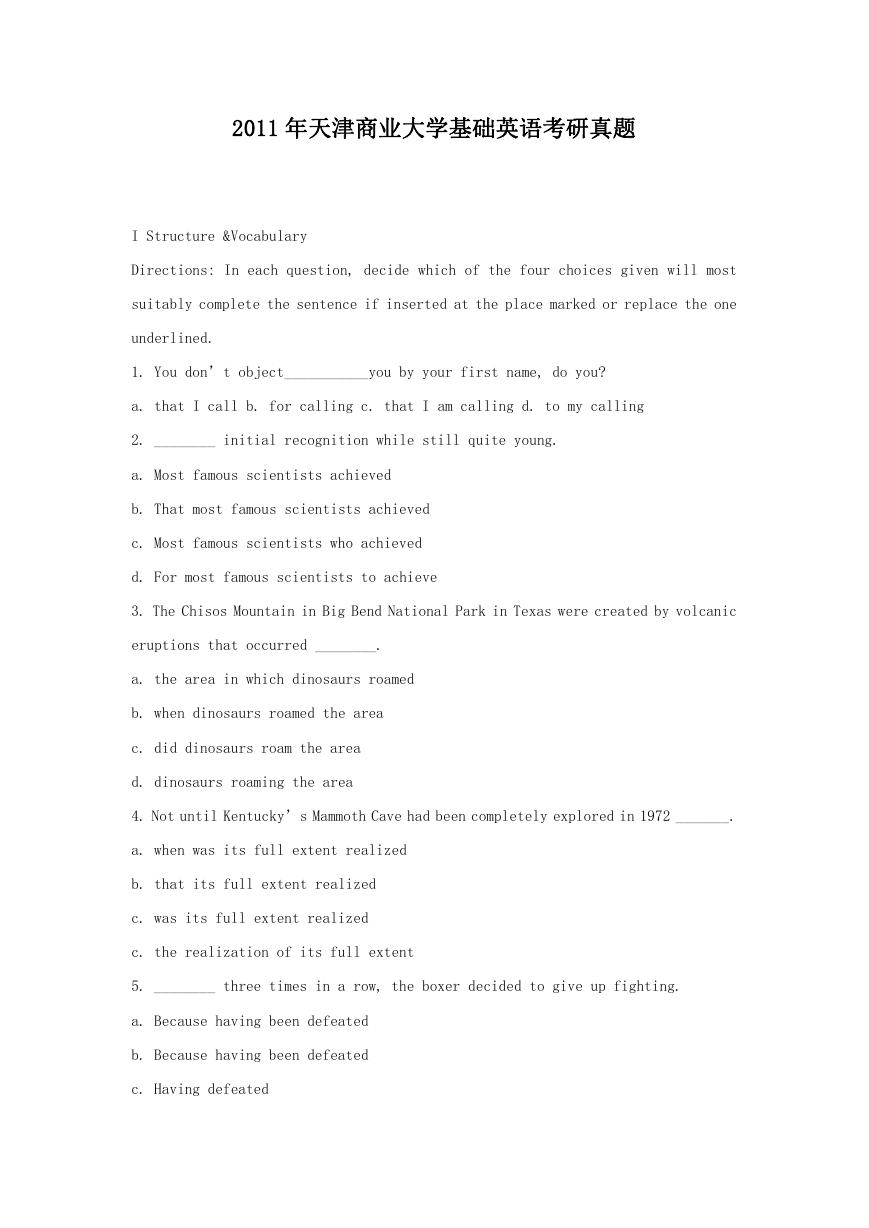
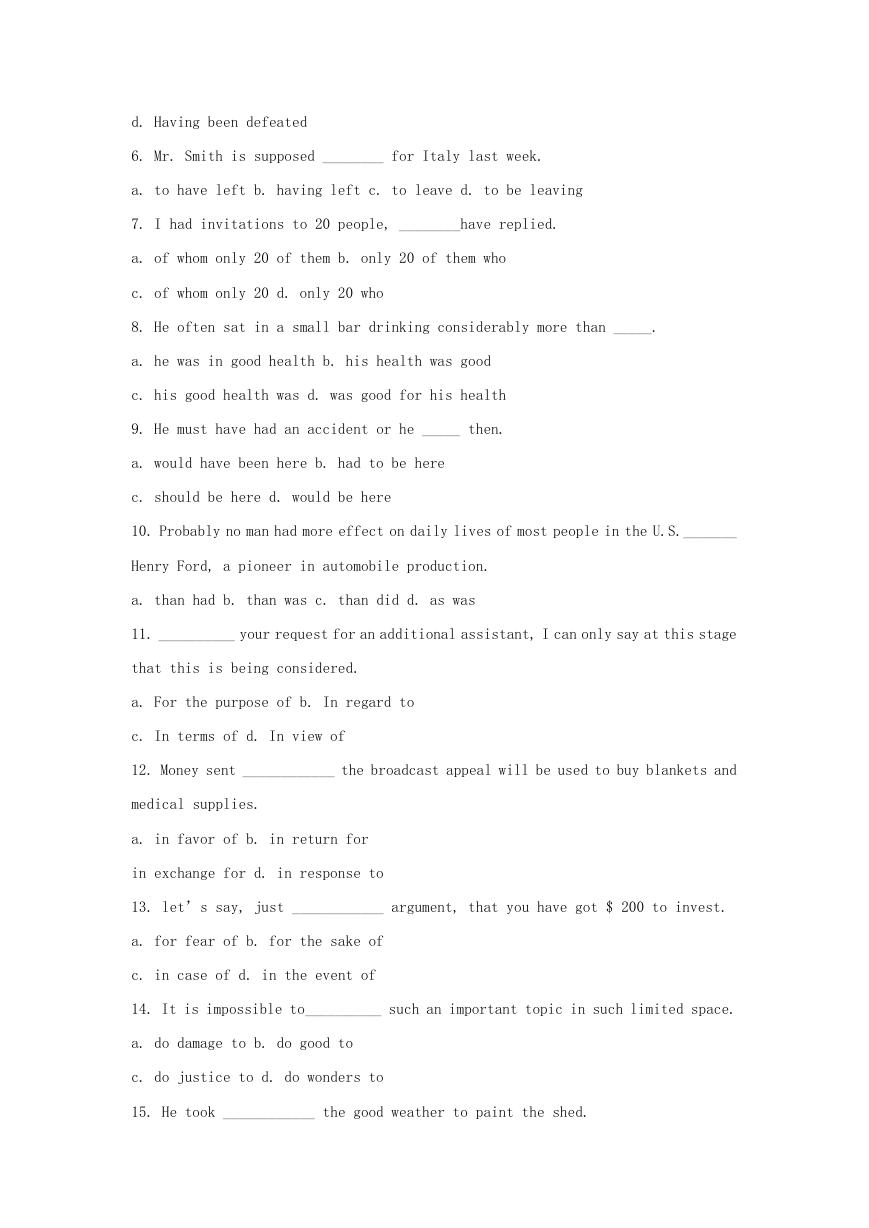
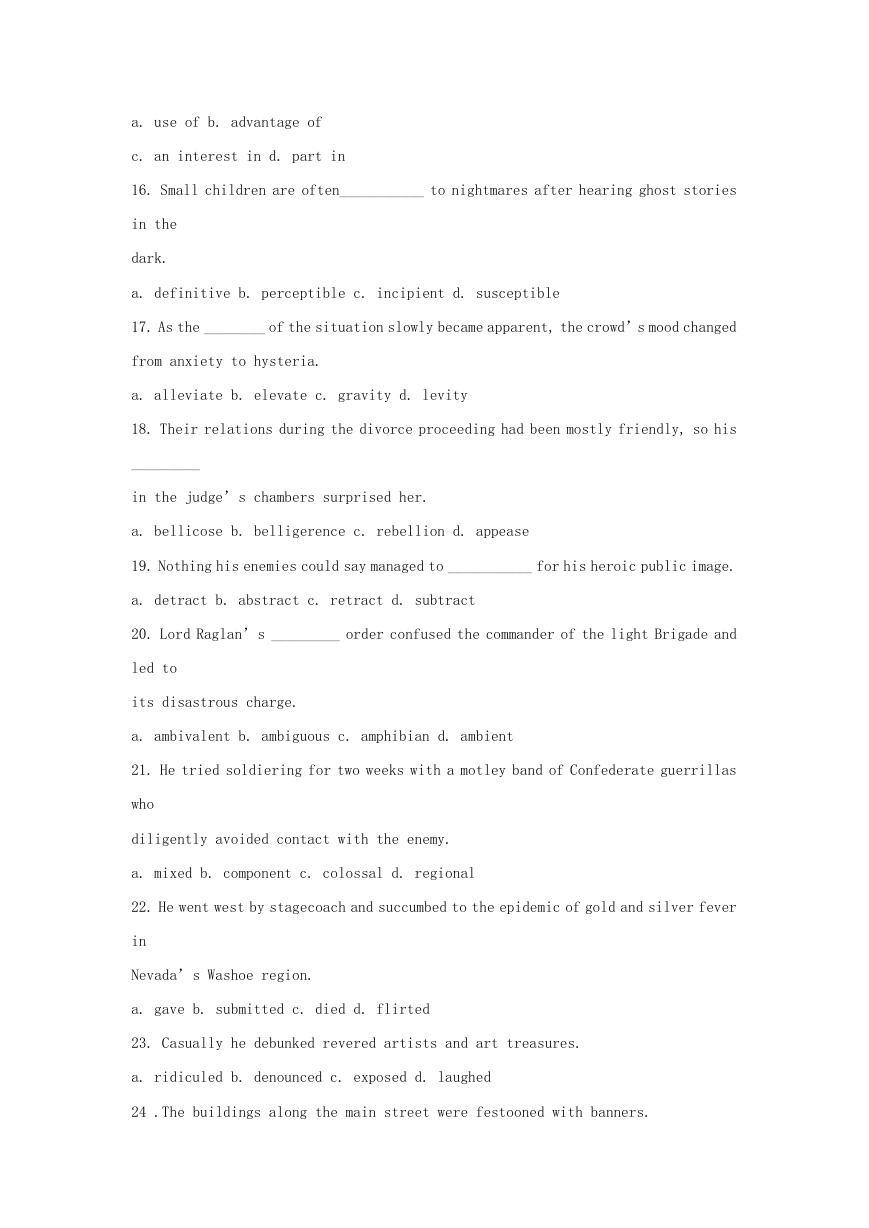

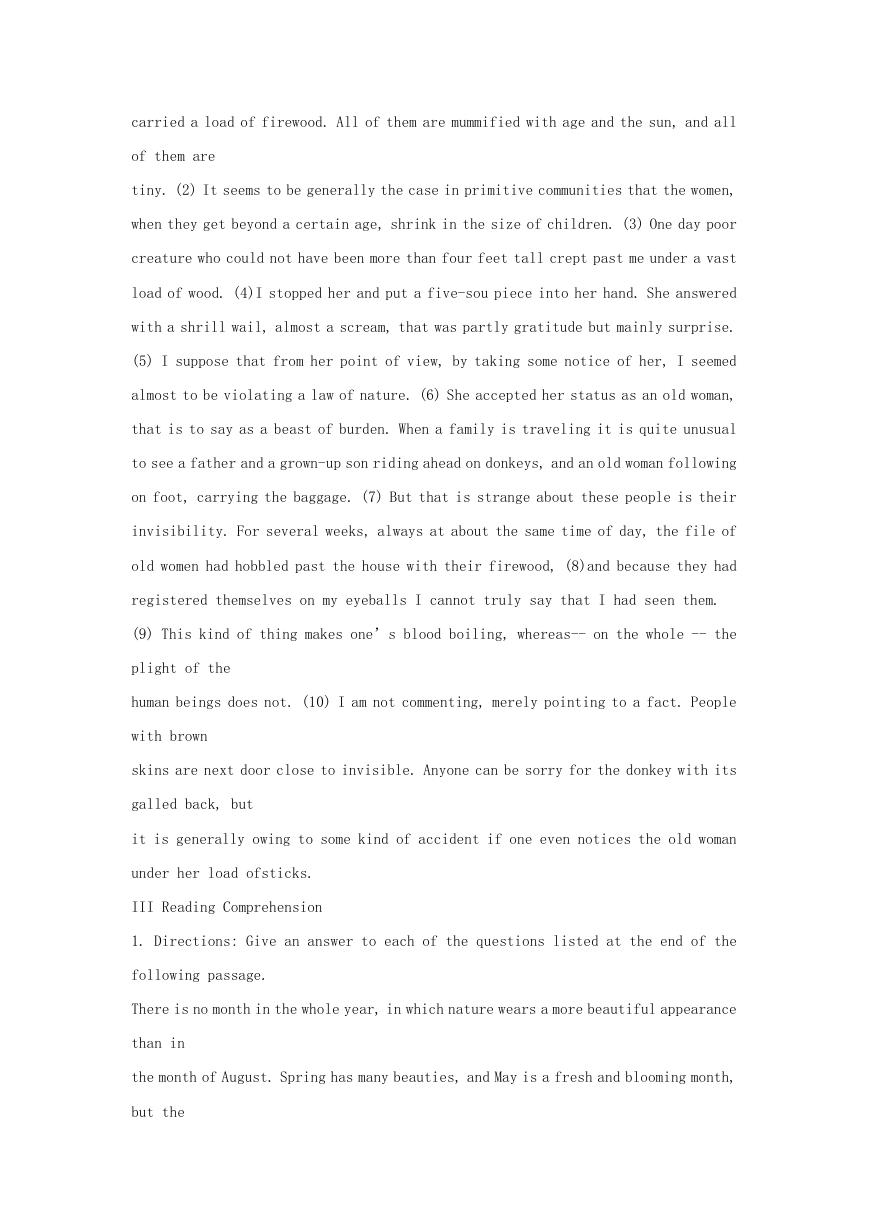
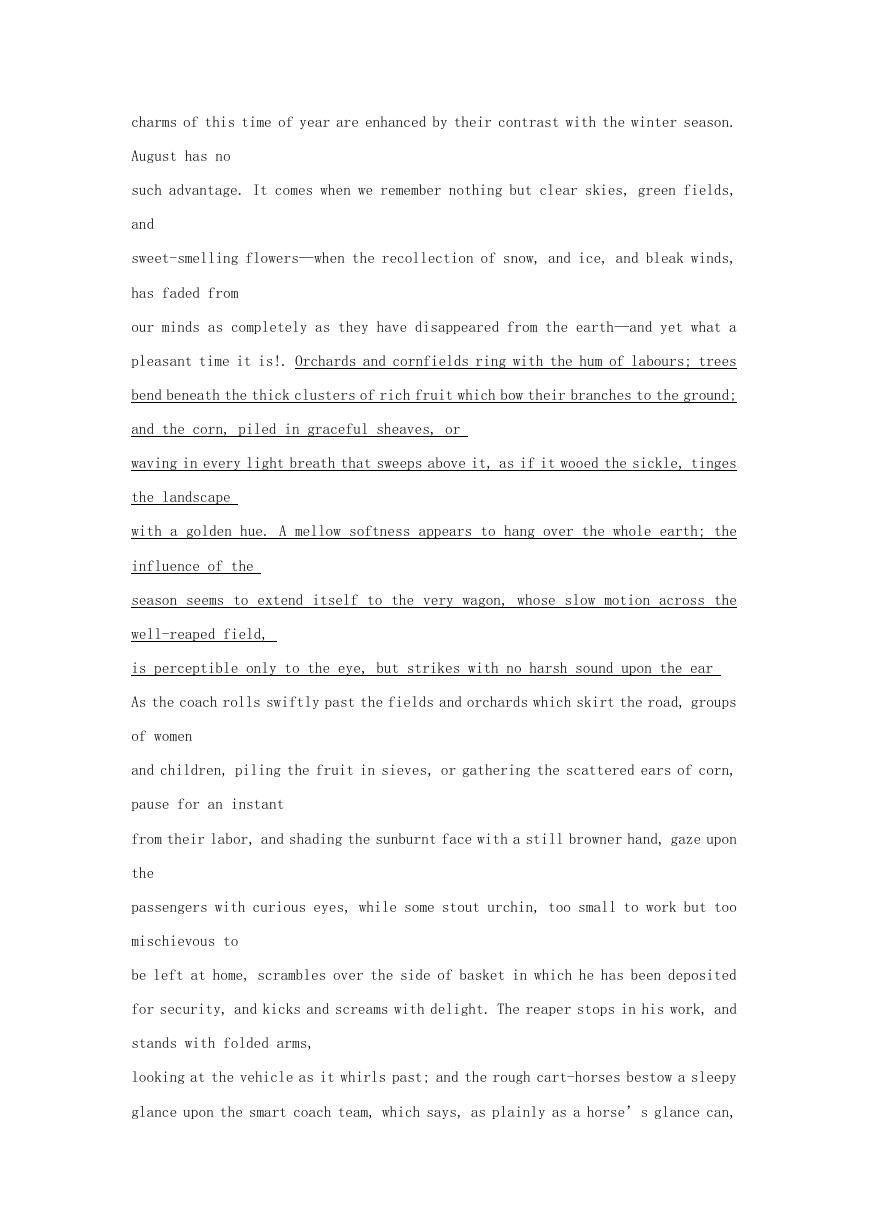
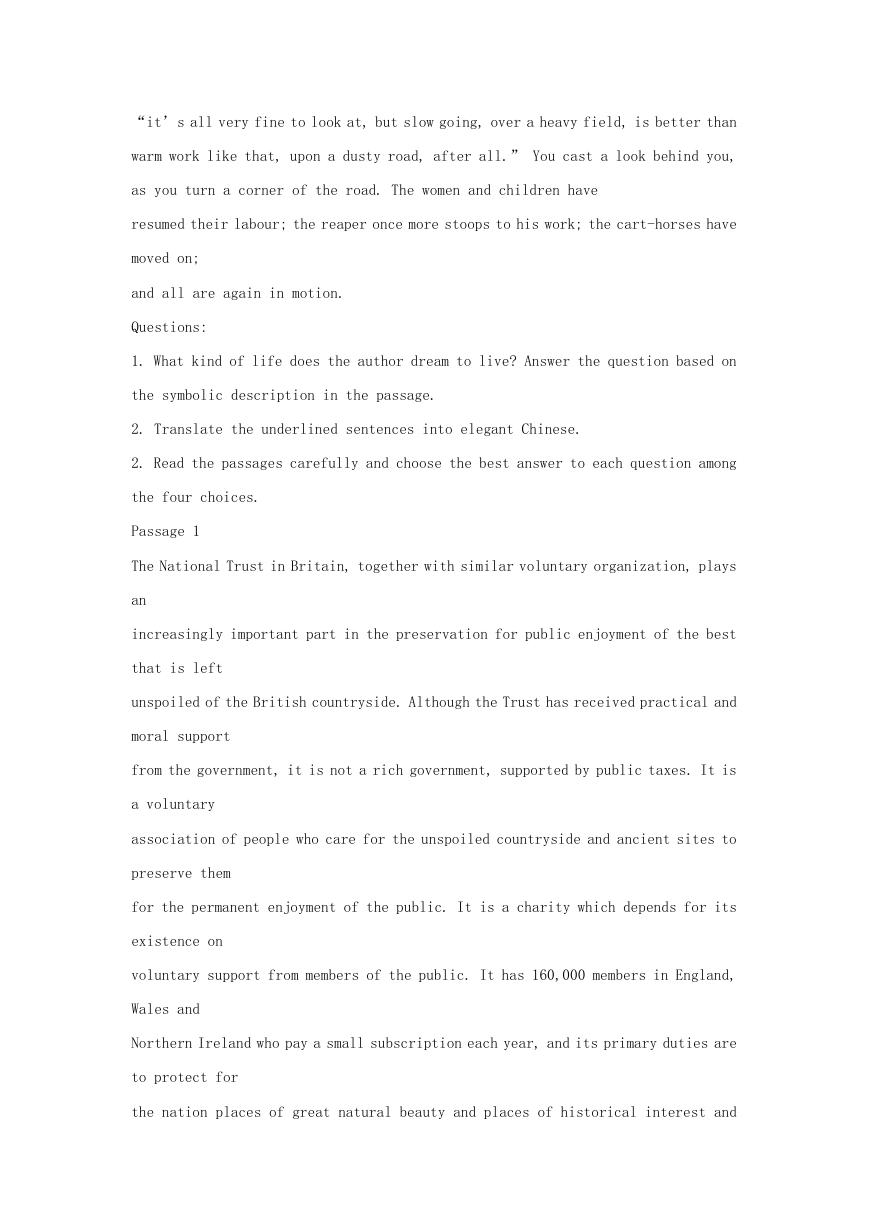
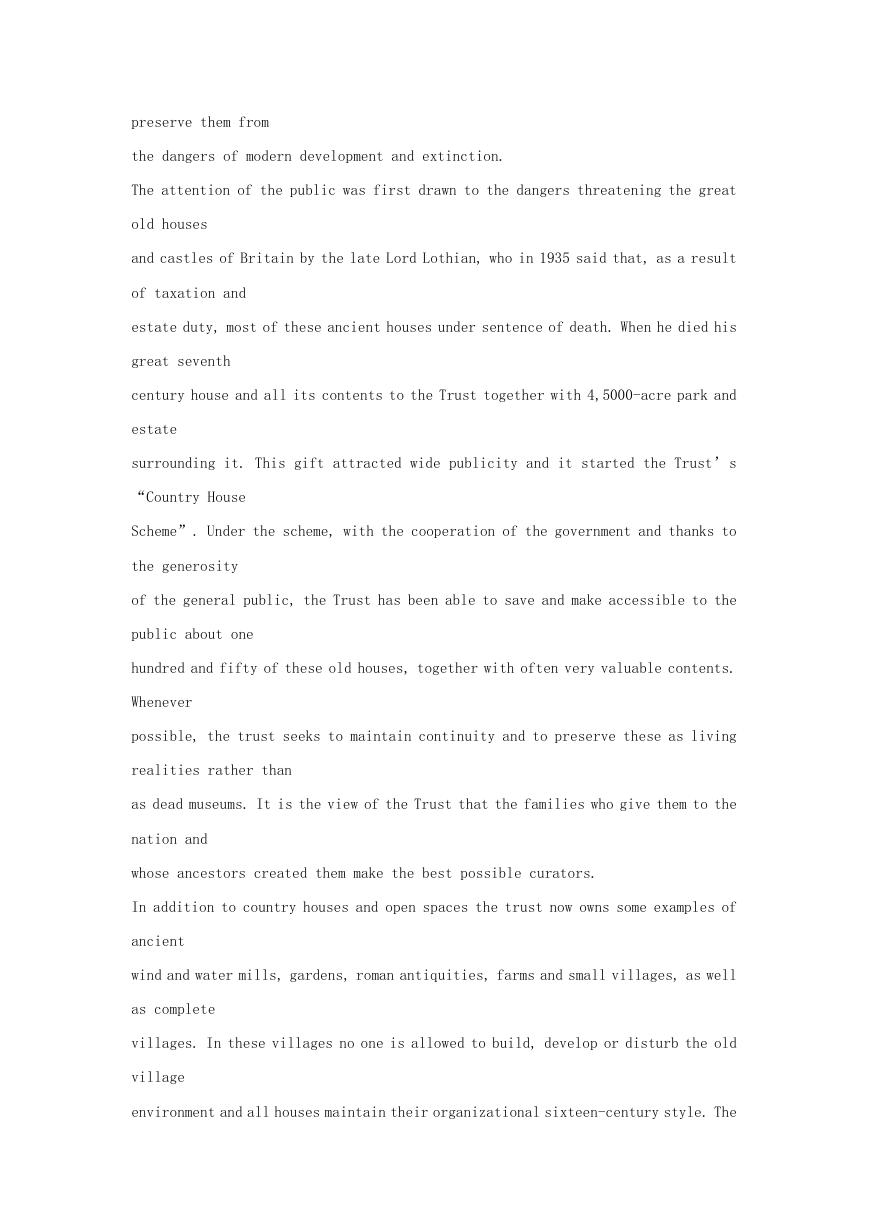








 2023年江西萍乡中考道德与法治真题及答案.doc
2023年江西萍乡中考道德与法治真题及答案.doc 2012年重庆南川中考生物真题及答案.doc
2012年重庆南川中考生物真题及答案.doc 2013年江西师范大学地理学综合及文艺理论基础考研真题.doc
2013年江西师范大学地理学综合及文艺理论基础考研真题.doc 2020年四川甘孜小升初语文真题及答案I卷.doc
2020年四川甘孜小升初语文真题及答案I卷.doc 2020年注册岩土工程师专业基础考试真题及答案.doc
2020年注册岩土工程师专业基础考试真题及答案.doc 2023-2024学年福建省厦门市九年级上学期数学月考试题及答案.doc
2023-2024学年福建省厦门市九年级上学期数学月考试题及答案.doc 2021-2022学年辽宁省沈阳市大东区九年级上学期语文期末试题及答案.doc
2021-2022学年辽宁省沈阳市大东区九年级上学期语文期末试题及答案.doc 2022-2023学年北京东城区初三第一学期物理期末试卷及答案.doc
2022-2023学年北京东城区初三第一学期物理期末试卷及答案.doc 2018上半年江西教师资格初中地理学科知识与教学能力真题及答案.doc
2018上半年江西教师资格初中地理学科知识与教学能力真题及答案.doc 2012年河北国家公务员申论考试真题及答案-省级.doc
2012年河北国家公务员申论考试真题及答案-省级.doc 2020-2021学年江苏省扬州市江都区邵樊片九年级上学期数学第一次质量检测试题及答案.doc
2020-2021学年江苏省扬州市江都区邵樊片九年级上学期数学第一次质量检测试题及答案.doc 2022下半年黑龙江教师资格证中学综合素质真题及答案.doc
2022下半年黑龙江教师资格证中学综合素质真题及答案.doc